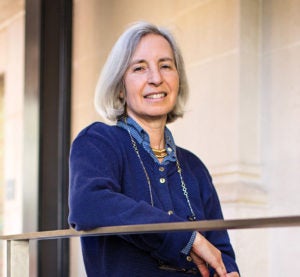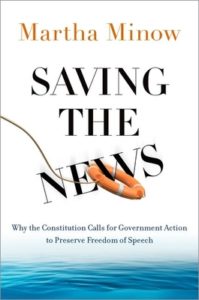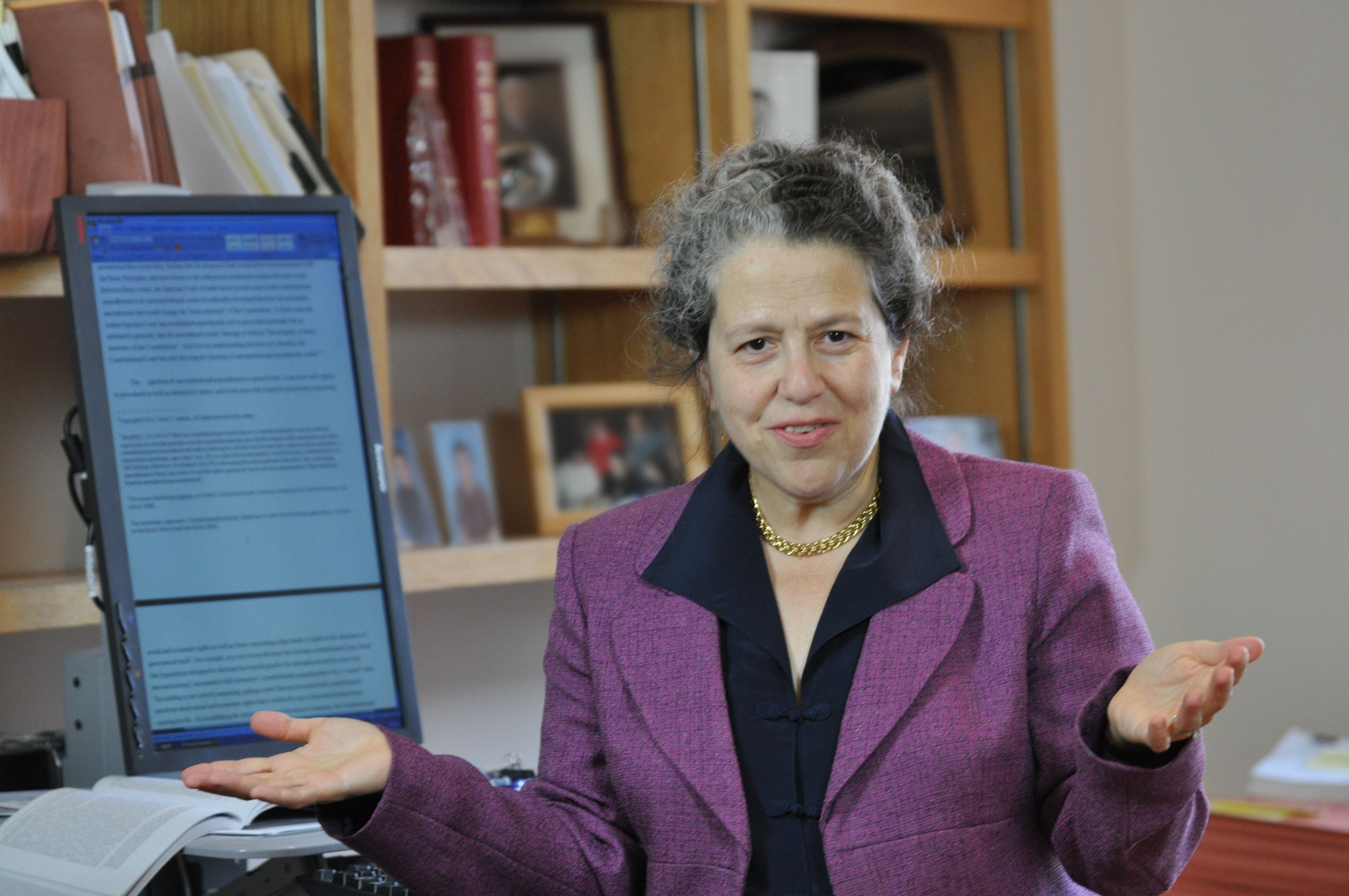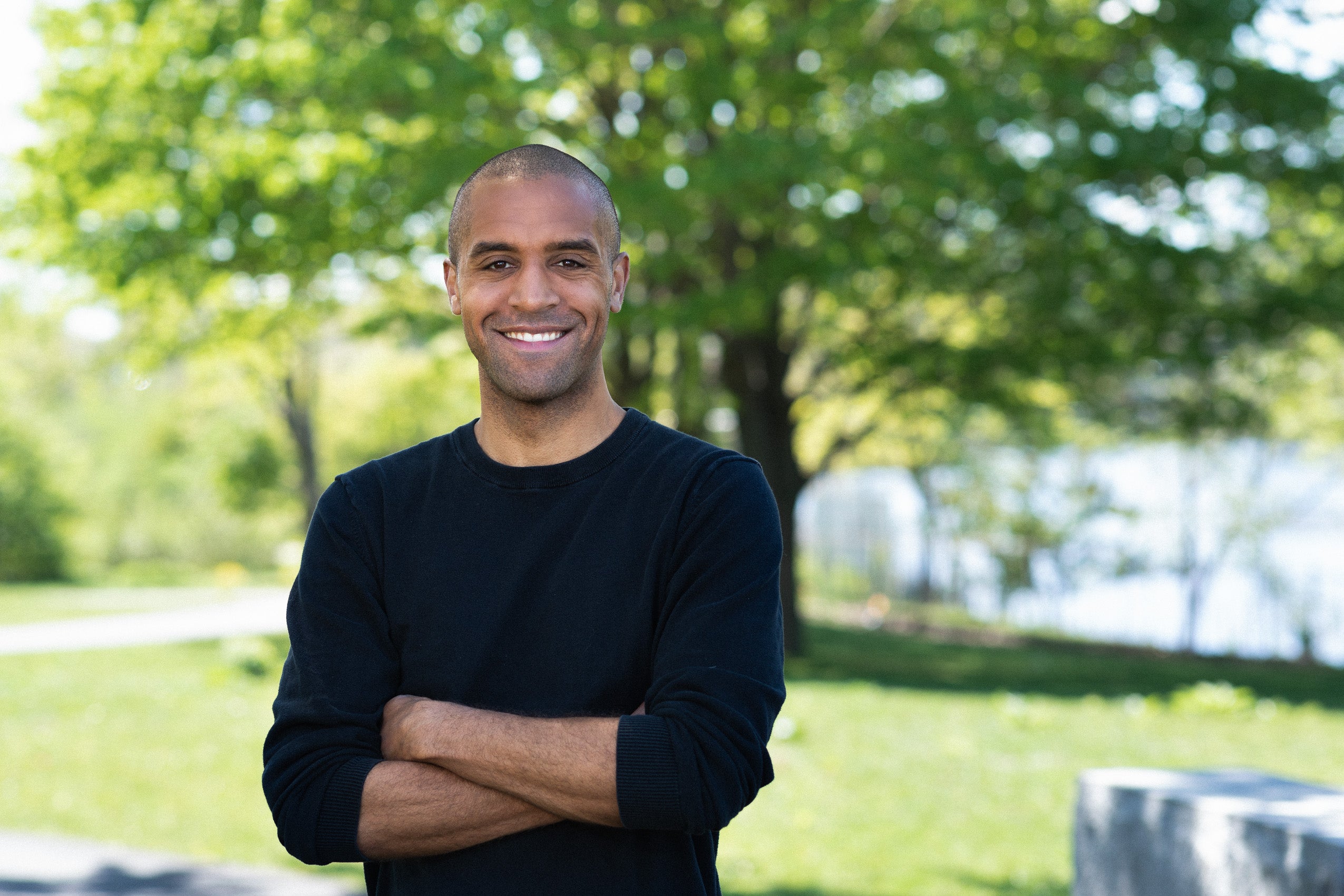
“I’m worried about democracy,” said Martha Minow, the 300th Anniversary University Professor and former dean of Harvard Law School, at a Harvard Law School Library Book Talk on November 8. Minow was explaining the impetus for her new book, “Saving the News: Why the Constitution Calls for Government Action to Preserve Freedom of Speech,” an argument for reforming and supporting America’s fourth estate — a critical part of our democratic system, she said.

During the event, which also featured Vicki C. Jackson, Laurence H. Tribe Professor of Constitutional Law, and Nikolas Bowie ’14, assistant professor of law, Minow and her co-panelists discussed the declining health of the news landscape, social media’s role in that decay, and the need to fortify the press to protect democracy.
“A political order controlled by the people needs people who are informed” about the world and issues on which they are voting, said Minow, adding that the country’s founders had considered the press so vital that it is the only private industry mentioned in the Constitution — the First Amendment, to be precise. “The presumption is it would [continue to] exist,” she said, yet today, “half of local communities now have only one — if any — news source.”
A political order controlled by the people needs people who are informed.
Martha Minow
Worse, said Minow, as legacy news organizations have withered or have been absorbed by national conglomerates, “A majority of people in the United States now receive news selected by computer-based mathematical formulas based on either their past interests or what the algorithm thinks someone like that person would want to see” in their social media feeds. And to keep users engaged, companies are incentivized to display divisive, inflammatory, or even incorrect information. Because of this, said Minow, “The digital platforms are winning in usage, profits, and revenues from advertising.”
Together, these elements have helped lead to the erosion of the traditional press, precipitating the deterioration of “democratic governance [itself], which depends on an effective watchdog news media,” she said.

Praising Minow’s book as “mandatory reading” for those who care about maintaining America’s constitutional democracy, Jackson elaborated on the importance of the press as an institution. “Recent studies show that in local areas where the newspapers have gone out of business, rates of corporate corruption in those areas have risen,” she said. “But it’s not just corruption that’s held in check by an independent press. There’s all sorts of government wrongdoing and wrongdoing by powerful private entities that we expect independent journalism to tell us about.”
Not only does the press have the resources to investigate these issues, said Jackson, it also has the power to retract or correct the factual record because of its ongoing conversation with the public — a relationship few institutions have. Further, she said, the press is “interdependent” with other important institutions, such as universities, with “academic work in history, law, political science, sociology, and other social sciences [being] very dependent on news reporting.”
There’s all sorts of government wrongdoing and wrongdoing by powerful private entities that we expect independent journalism to tell us about.
Vicki Jackson
Bowie said that he read Minow’s work as a refutation of the idea that the only solution to the consolidation of information is the abandonment of democracy — that her book is, in fact, a call to revitalize it. “I think of democracy as relying on a similar foundation of political equality, or at least the pursuit of political equality, creating a community in which all of us are equally empowered to make community decisions. And so the relationship between the press, political education, and democracy, I think, is mutually reinforcing.”

Reiterating the importance of local news in particular, Bowie added, “Democratic norms of free discourse, of dissent, of dissemination of information to all, and the recognition that all can contribute to information, are really important for ensuring that collective decision-making brings in a diverse body of experience.”
To respond to these ongoing threats to the news ecosystem, Minow then turned to the subtitle of her book, saying that government action was needed to ensure the survival of the press — and thus democracy itself. She suggested three broad categories of reforms, the first of which is to hold media companies responsible for what happens on their platforms.
“The internet social media platforms are insulated from the liabilities that apply to conventional media — defamation, false information, threats,” she said. Section 230 of the Communications Decency Act gives “a subsidy to these entities that once were thought to be fledgling and in need of government help,” she said, but today are “among the largest companies in the history of the planet.”
And there are other ways to protect access to credible information, said Minow. Congress could pass more and better consumer protection laws focused on social media users, for one. America could also choose to bolster local and national media by offering direct subsidies to outlets or tax rebates for subscribers.
The relationship between the press and political education … with democracy, I think, is mutually reinforcing
Nikolas Bowie
While Bowie agreed with boosting support for journalism, he suggested that advocates look beyond market-based solutions. Citing the United States’ low per capita spending on public media, “To the extent that we are suffering from an absence of jobs in local media, then perhaps the solution is for the government to hire people, or at least to pay for local news sources to hire people to actually investigate and write the news,” he said.
Bowie and Jackson also pressed Minow to elaborate on the extent to which she believed that Congress has an affirmative duty to protect the press, rather than merely the option to do so. Did she think such actions were compulsory?
Minow responded that she had carefully avoided using the word “required” when it came to the government’s charge to foster a healthy news ecosystem. Rather, she said, “At a minimum, the weak meaning [of the Constitution] is that the government is permitted to act. But that’s not so minor given the aggressiveness of the Supreme Court in using the First Amendment to strike down regulation. In that sense, it’s urging restraint on the courts.”
But, Minow added, “I do think that there are duties.” Those duties, she said, extend not just to the legislature, but to government actors at every level — and even to Americans themselves.
“I always teach in constitutional law that the obligations to uphold the Constitution apply not only to federal judges, but to everyone who is a public official and who swears allegiance to uphold the Constitution,” she said. “I also think that there are obligations that citizens have. We all could play important roles to try to remedy the problems that we are talking about.”
